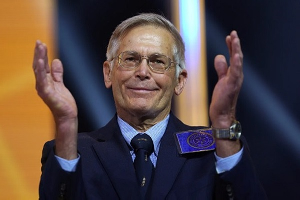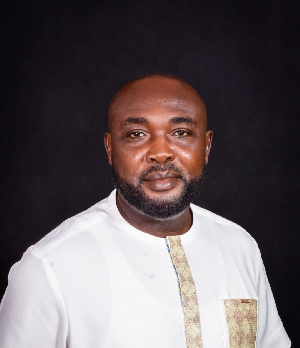A GNA feature by Hannah Asomaning
Accra, Aug. 7, GNA - Myron Jackson, Director of the Virgin Islands State Historic Preservation Office, has been able to trace his ancestry roots to Tumu in the Upper West Region.
Myron realized that there was a linkage between his great grandfather's name and the name of the current chief of Tumu, the Kanton family.
The Kanton family has since accepted Myron as part of the family and he has been visiting Ghana from time-to-time knowing that he has a family in Ghana.
Duane Howell, who describes himself as a private citizen of the United States Virgin Islands, has also through research found out that his great grandmother was shipped from the Christiansburg Castle at Osu in Accra.
Assuming his great grandmother came from Osu or from any of the communities where the slaves were taken from then there is a possibility that his ancestry came from Ghana.
A bit of history might help at this juncture. In 1685, the Danish government signed a treaty with the Dutch at Brandenburg, which allowed the Brandenburg American Company to establish a slave-trading post on St. Thomas, an island on the US Virgin Islands.
In the Danish West Indies, currently the US Virgin Islands, slaves laboured on sugar, cotton and indigofera plantations. Each island's economy prospered through sugar plantation and slave trading. While St. John and St. Croix, Islands in the United States Virgin Islands maintained plantation economy, St. Thomas developed into a prosperous centre of trade.
The United States Virgin Islands has a large population of blacks, possibly because a lot of the slaves from Africa were taken there to work on the plantations in the then Danish West Indies.
On July 2, 1848 some slaves rebelled against their masters on the island St. Croix and some 5,000 of them became free while about 17,000 others remained enslaved. A liberal governor, Peter von Scholten embarked on an advocacy to get all the slaves freed on the next day July 3 1848; hence the celebration of Emancipation Day on the Islands every July 3 to this day.
The Islands remained under Danish rule until 1917 when the United States purchased them for strategic reasons during World War I. St. Croix, St. Thomas and St. John became the US Virgin Islands. Among the planters and civil authorities in the Danish Caribbean were the "Minas" or El Minas (Blacks), who believed that at their death they would return to their fatherland.
A popular Spanish saying; "mij dodte mij loppe in myn lande" translated to mean, "When I die, I shall return to my own land" in the slavery era was said to signify the end of the Amina slaves' absence from their homeland.
The Aminas, who were notorious for always trying to rebel against their masters were believed to have their roots from Akwamu in Ghana. Many of the people in the Virgin Islands also believed they came from Akwamu in Ghana. Shelly Moorhead, one of such people, came to Ghana to participate in this year's celebration of Emancipation Day. Shelley publicly declared: "I am an Akwamu. I come from Akwamu. I am back to reunite with the family" when the people of Asuogyaman organized a welcoming durbar for them.
Danish author Thorklid Hansen in his history of the Danish West Indies provides the African names of several of insurgents. They include: "Quassi; Asa - medicine man or witch doctor; Adu, Coffy or Coffie, Asari and Cuba.
Other important names which link the Virgin Islands to Africa are King June, who was said to be a "Chief in Africa"; Kanta; King Bolombo; Prince Aquashie and Breffu. These were also leading figures in the rebellion against slavery.
The population in the US Virgin Islands is largely made up of Caribbean people, whose ancestors were Africans and Europeans. The Virgin Islands has mixed population made up of people from the Caribbean, Americans from the mainland, Europeans and Hispanics. English is the main language in the US Virgin Islands and the majority of the population speaks, writes and reads English only. Some residents speak quickly and with an accent making it difficult to understand.
Emigrants from other islands have brought other languages to the Virgin Islands. It is, therefore, not uncommon to hear Spanish, French-Patois and Creole. Virgin Islanders are religious people. Popular religions include Christianity and Judaism.
Like in Ghana superstition and storytelling are very common. There are often stories about spirits or jumbie.
Bru Nansi or spider-man is a popular character in these stories just like Kwaku Ananse in Akan folklore.
Similar superstitions like no whistling in the night; and values such as respect for the elderly and hospitality for visitors are common denominators in Ghana and the Virgin Islands.
Osabarima Kwesi Atta II, Omanhene of the Oguaa Traditional Area, on Emancipation Day 2006 noted that emancipation celebration should be made part of the Continent's history and should be given recognition. He said all Africans should be able to reflect on the unmentionable brutalities their ancestors went through, say enough is enough, and rise to fight for the total liberation of the African Continent.
"The atrocities and difficult times our ancestors went through in the past are coming back to the Continent in a more subtle way," he said, and urged all Africans to resist.
People, who visited Ghana from the Virgin Islands this year to join in the celebration of Emancipation, shared the similarities in belief. They were taken through rituals to accept them back into the Ghanaian community.
The group visited Keta; Bono Manso; Kumasi; Asuogyaman; Cape Coast; Elmina; Anomabo; Christiansburg Castle in Osu, Accra and other centres in Ghana where the slave trade left visible relics. They were given Ghanaian names, thought how to wear the traditional cloth. Eto, mashed yam or plantain with palm oil was prepared for them to taste.
Duane Howell, who was given the name Akorli when he visited Keta in the Volta Region, said the experience he had in Ghana was priceless. The Trans-Atlantic Slave Trade is a part of history, which cannot be wished away. There is, therefore, the need to accept that history and turn it into positive one.
Africans all over the world must work hard towards making the 21st century the African Century, Mr Jake Obetsebi-Lamptey, Minister of Tourism and Diasporean Relations said.
Emancipation celebration must be used as a platform to exchange ideas and expertise that could be brought to bear on the development of the African Continent.
Click to view details



Diaspora News of Tuesday, 8 August 2006
Source: GNA
















